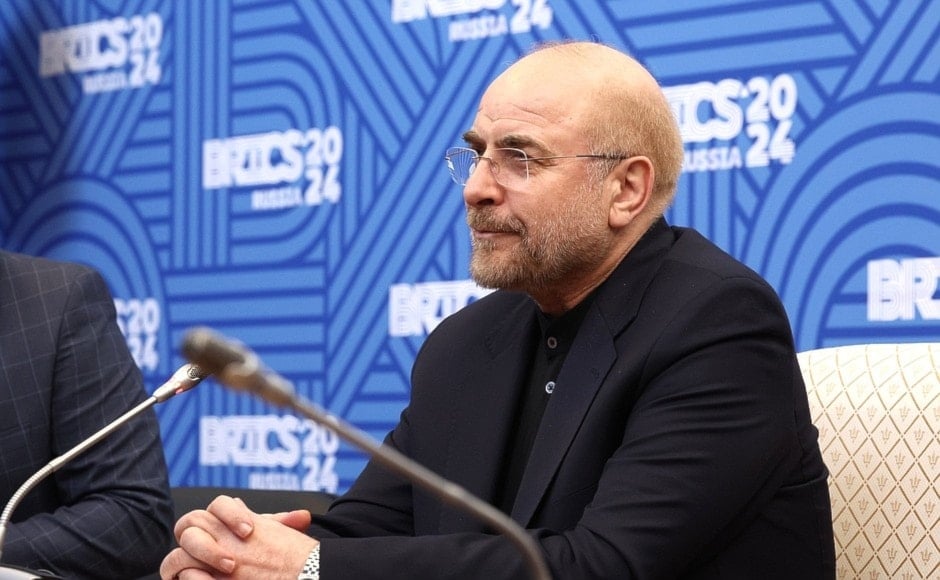Iran signals readiness to join Pakistan-Saudi defense pact
Iran says it is open to joining the Pakistan-Saudi defense pact and calls for an OIC joint military force, while affirming support for Gaza and stronger ties with Islamabad.
-

Speaker of the Islamic Consultative Assembly of Iran, Mohammad Bagher Ghalibaf, during the 2024 BRICS summit in Moscow, Russia (TASS)
Iranian Parliament Speaker Mohammad Bagher Ghalibaf stated that Tehran is open to joining the recently signed defense agreement between Pakistan and Saudi Arabia. Speaking to Pakistan’s Geo News, Ghalibaf urged member states of the Organization of Islamic Cooperation (OIC) to consider establishing a joint military force similar to NATO.
Ghalibaf stressed that any deployment of forces from OIC states to Gaza must strictly aim to protect Palestinians and deliver humanitarian support, adding that such moves should not result in reinforcing the dominance of the Israeli regime in the besieged territory.
“If sent, the goal must only be protecting Palestinians and providing assistance to the Gaza Strip,” he said.
Ghalibaf also commented on the election of Zohran Mamdani as mayor of New York, saying political change in the United States would not in itself resolve longstanding injustices.
“I do not believe elections can end the oppression of the United States and the Israeli regime,” he stated.
Tehran, Islamabad highlight potential for deeper strategic partnership
His comments come as senior Iranian and Pakistani officials continue to stress the importance of strengthening bilateral cooperation. Earlier, Ali Larijani, secretary of Iran’s Supreme National Security Council, said Tehran and Islamabad share the necessary foundations to elevate their relations into a long-term strategic partnership.
Larijani described the recent Pakistan–Saudi defense agreement as a “positive and smart step” toward addressing common regional security challenges. The pact, signed on September 17 during Pakistani Prime Minister Shehbaz Sharif’s visit to Riyadh, aims to expand defense cooperation and strengthen joint deterrence capabilities.
Ghalibaf meets Pakistani leadership
During his parliamentary visit to Islamabad, Ghalibaf met National Assembly Speaker Ayaz Sadiq and expressed appreciation for Pakistan’s solidarity with Iran amid the ongoing Israeli aggression. He highlighted what he described as the enduring friendship between the two nations and said cooperation can expand across political, economic, and cultural sectors.
He also referred to Iran’s recent response to the Israeli regime’s attack on Iranian territory, saying the retaliation marked an unprecedented moment in the decades-long struggle.
Ayaz Sadiq reiterated Pakistan’s support, noting that the parliament had condemned the assault and views the Israeli occupation as a shared adversary. He added that both sides would soon convene bilateral parliamentary committees to develop new frameworks for cooperation.
In a separate meeting with Acting President Yusuf Raza Gilani, Ghalibaf argued that the Israeli attack, launched while nuclear negotiations were underway, demonstrated the duplicity of both Washington and the Israeli regime. He said Iran’s response was swift and decisive.
Expanding strategic partnership
Larijani had confirmed in late October that the ties between Iran and Pakistan have the potential to extend beyond the current level of cooperation and advance toward a long-term strategic partnership.
During the Pakistani Interior Minister Mohsin Naqvi’s visit to Tehran, Larijani discussed ways to strengthen the security standing of both countries within current diplomatic dynamics, emphasizing the expansion of joint strategic cooperation to maintain stability and security in the region.
Furthermore, the SNSC Secretary emphasized the need to deepen cooperation across security, defense, political, and economic fields, highlighting that Pakistan’s stance during the 12-day war demonstrates a shared understanding of the strategic realities in the region.
The meeting also addressed strengthening bilateral cooperation in political, security, and economic areas, as well as enhancing joint regional coordination between Iran and Pakistan.

 4 Min Read
4 Min Read








